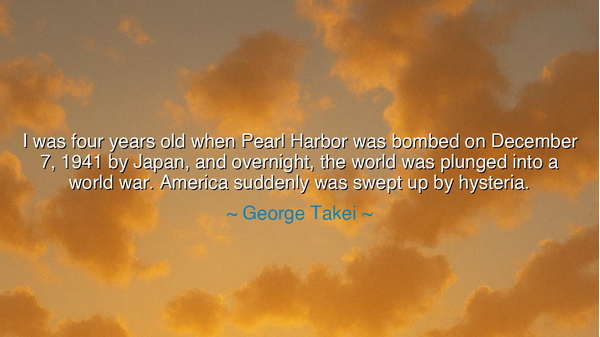
I was four years old when Pearl Harbor was bombed on December 7
I was four years old when Pearl Harbor was bombed on December 7, 1941 by Japan, and overnight, the world was plunged into a world war. America suddenly was swept up by hysteria.






Hear, O children of memory and seekers of truth, the testimony of George Takei, who declared: “I was four years old when Pearl Harbor was bombed on December 7, 1941 by Japan, and overnight, the world was plunged into a world war. America suddenly was swept up by hysteria.” In these words, the actor and activist does not speak as a distant historian, but as one who lived through the fire of fear in his own childhood. He carries the memory of innocence pierced by violence, of a nation trembling, and of the dangerous tides that hysteria can unleash.
The attack on Pearl Harbor was a thunderclap in history. In a single morning, the illusion of American safety was shattered. Ships lay burning, soldiers perished, and the Pacific was set aflame. To many, it was a call to arms, a summons to unity and defense. But to others—those who looked different, those whose heritage bore the mark of the enemy—it became a shadow that would strip them of dignity, rights, and home. This is what Takei names when he speaks of hysteria: the irrational fear that confuses enemy armies with innocent neighbors, and justice with suspicion.
For Takei’s family, and for over one hundred thousand Japanese Americans, the hysteria after Pearl Harbor meant internment. Though no crime was committed, though no guilt was proven, families were uprooted from their homes, herded into camps, and watched by armed guards. A child of four years old, Takei could not understand why his family’s loyalty was doubted, why their freedoms were seized. But he would grow to understand that fear, unchecked, can corrode the very foundations of liberty.
History gives us many warnings of this truth. In the French Revolution, fear of traitors led to the Reign of Terror, where suspicion alone could bring a man to the guillotine. In the McCarthy era, fear of communism destroyed reputations and lives with mere whispers of accusation. And after September 11, 2001, hysteria again arose, leading to suspicion, surveillance, and prejudice against entire communities. Each time, the pattern is the same: fear sharpens into hysteria, hysteria blinds reason, and justice is trampled.
Yet, Takei’s words are not only sorrow—they are a call to vigilance. He teaches that even in the darkest hours of national crisis, the measure of a people is not only in how they defend their borders, but in how they uphold their principles. To yield to hysteria is to let the enemy wound not only the body, but the soul of the nation. For no bombs can destroy liberty as surely as fear can, if left unchallenged.
Therefore, O children of tomorrow, take this lesson deep into your hearts: when calamity strikes, when fear grips the land, hold fast to reason, compassion, and justice. Do not cast suspicion upon the innocent, nor allow hysteria to silence conscience. Remember the story of George Takei, who as a child bore the weight of prejudice not because of his deeds, but because of his face. Let his memory be a warning to you, that you may not repeat such errors in your time.
So remember this wisdom: Pearl Harbor plunged America into war, but it was hysteria that wounded its own citizens. Learn from this: fear is natural, but hysteria is a choice. Choose courage, choose justice, choose to see your neighbors not as enemies but as fellow souls. For a nation is only truly strong when its fear does not consume its humanity.






BHBao Han
This recollection reads like both witness testimony and moral warning. The idea that 'America was swept up by hysteria' underscores how fear can override principles, even in nations founded on liberty. It raises a timeless question: how do we distinguish justified vigilance from xenophobic overreaction? Takei’s story reminds us that wartime hysteria doesn’t just happen—it’s manufactured through rhetoric, media, and policy. Are we any better prepared to resist that cycle today?
GDGold D.dragon
There’s something haunting about the child’s perspective embedded in this account. At four years old, Takei wouldn’t yet understand politics or strategy, only the sudden change in atmosphere—the tension, the whispers, the glances. His phrase 'swept up by hysteria' feels like a quiet indictment of how adults lose moral bearings under stress. I’d like to explore how this early experience shaped his later activism and his lifelong critique of state-sanctioned prejudice.
THPhan thuc han
This quote captures the speed at which peace collapses into chaos. Overnight, an entire nation’s psyche shifts—from normalcy to suspicion, from security to hysteria. I’m struck by how fragile social trust becomes in moments of crisis. Takei’s memory invites reflection on how quickly war transforms neighbors into potential enemies. What mechanisms, if any, can societies build to resist such emotional contagion when fear meets nationalism?
HChoang chung
As a reader, I sense both innocence and tragedy in this recollection. Takei’s memory of being four years old during Pearl Harbor transforms history from abstraction into lived experience. The phrase 'America suddenly was swept up by hysteria' points to how fear can overpower reason, even in democratic societies. It makes me wonder how collective panic justifies actions—like Japanese American internment—that later generations must reckon with. Can fear ever excuse the abandonment of justice?